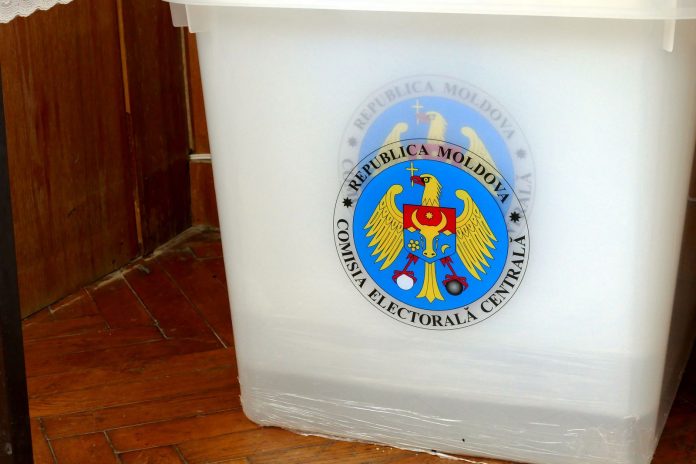Elections of February 24 in Moldova are still contested by the parties of the democratic Opposition.
ACUM DA-PAS Electoral Block presented its report, accounting all the major violations that took place before, during and even after the February 24 parliamentary election and that had a significant impact on the election outcome.
Electoral observers could hardly witness the enormous scale of the highly technical and well disguised fraud, but, for instance, the electoral corruption associated with the 37,000 voters bused in from Transnistria is hard to deny in light of dozens of media accounts (1, 2, 3, 4, 5).
In addition more than half a million citizens of Moldova residing abroad were denied the right to vote as they have expired passports and because of the prohibition to vote with valid national identity cards. The Government blamed the ban on the Association Agreement with the EU, despite the fact that the agreement had been in force during the presidential election of 2016, when there had been no such ban.
Hundreds of thousands of citizens residing abroad were denied the right because there were not enough polling stations open. The government/Central Election Commission disregarded its own regulations on preliminary registrations as it refused to open more polling stations in cities in Europe and North America were hundreds of people registered online, but instead opened in a few places where barely anyone had registered.
Un unprecedented harassment of the opposition
OSCE ODIHR preliminary report stated that “The campaign took place against the backdrop of disaffection with public institutions and was tainted by allegations pressure on public employees, strong indications of vote buying and the misuse of state resources.”
“As demonstrated by the campaign, the new electoral system regrettably confirmed the main concerns raised by the Council of Europe’s Venice Commission, in particular the lack of effective mechanisms to prevent undue influence by wealthy businesspeople, combined with a poor system of supervision of party and candidate funding, and inadequate penalties,” stated Claude Kern, Head of the Parliamentary Assembly of the Council of Europe (PACE) delegation.
The government has resorted to the unprecedented harassment of the opposition and its activists. It is worth highlighting the actions taken by the so-called “Open Dialogue” parliamentary inquiry committee aimed at discrediting the opposition.
Less than three months before the elections, the government amended the electoral legislation allowing the holding of a referendum along with the parliamentary elections and canceled the ban on campaigning on election day. In the long run, it turned out that the referendum was simply a pretext to confuse voters, while the ban on campaigning on election day was meant to “legalize” the massive use of administrative resources and the purchase of votes on election day.
The governing party and its proxies (PD, PSRM, Shor Party) have used non-transparent financial resources and significant amounts of funds used for elections have gone undeclared. One example is the payment for Facebook ads. Facebook issued a statement confirming that about 20,000 US dollars were spent on advertisement in favor of the ruling party in a smear campaign against the opposition coordinated from the government building, but the Democratic Party’s financial reports failed to include such expenses. The CEC refused to examine our complaint and failed to sanction PDM.
The CEC, electoral bodies and courts did not ensure a fair examination of complaints and appeals filed both before and after the elections. The CEC’s selective approach to the use of administrative resources is manifest: in case of a referral lodged by two parties close to the governing party (Liberal Party and Shor Party), it was examined and the contested party was sanctioned, dozens of complaints and appeals filed by the ACUM DA-PAS Bloc against the Democratic Party have not even been examined.
The vote of Transnistria
In what concerns the separatist region Transnistria, which is under the control of Moscow-back militias, a large number of citizens were brought in and voted in exchange for about 20 USD in the 47th and 48th districts designated for Transnistrian residents. Moreover, electoral contestants could not campaign in the separatist region and the residents of the region were not informed about the political situation in Moldova. In the case of these two districts, the principle of free and fair elections was blamably violated. If measures are not taken, one can only imagine how many votes are going to be bought in Transnistria next time and what effect this will have on Moldova’s political landscape.
According to independent watchdog Promo-LEX, there were over 1000 violations. According to our account, there were over 1500 irregularities and incidents on the day of voting, which exceeds about three times the number of incidents recorded in the presidential election on 13 November 2016. Unlike in previous elections when it took just three days, the CEC only published the voting data from each polling station today – ten days after the election, leading to further allegations of fraud.
“Starting from the many violations of the legislation and internationally recognized standards, we find that the elections of 24 February were neither free nor fair,” declared ACUM DA-PAS in press release.

